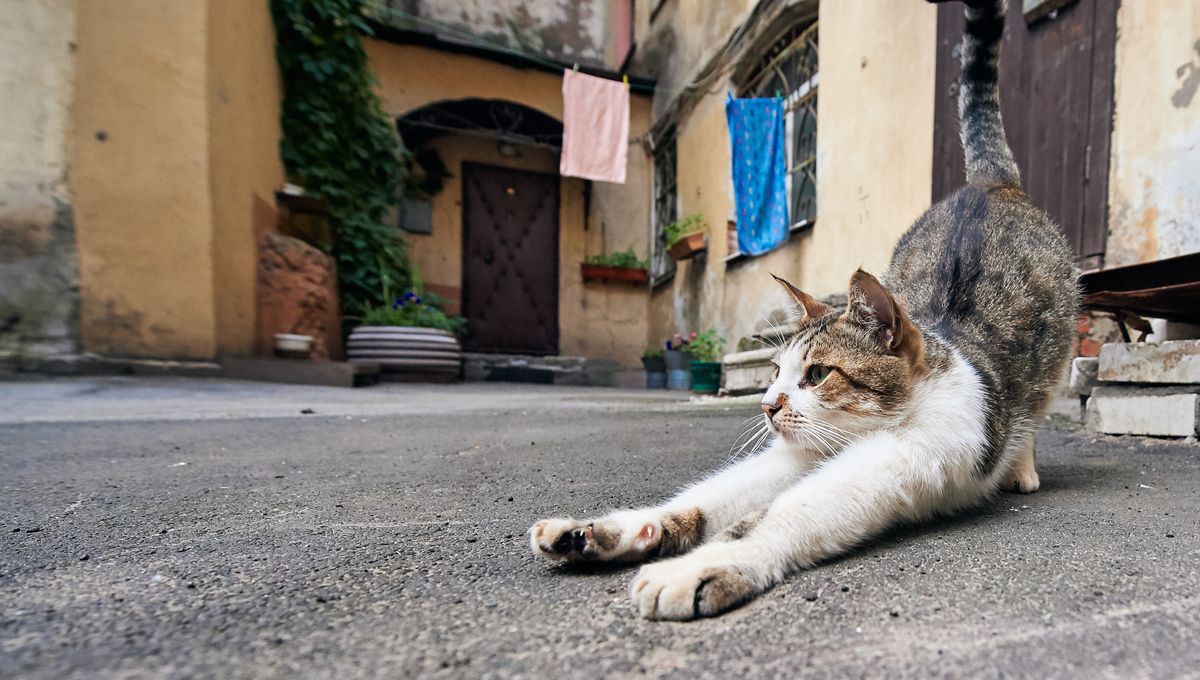
Few debates are more heated than whether to keep your cat indoors or let them meander around the neighborhood. Unfortunately for free-roaming fans, a new study has uncovered another reason to keep cats inside: unexpected exposure to flea treatments.
ADVERTISEMENT GO AD FREE
Despite cats’ innate desire to wander and hunt, they are often kept inside by their human servants due to concerns about their impact on local wildlife. As vicious, highly efficient hunters, pet cats can be responsible for a staggeringly high number of animal deaths.
This has already been well established by a bunch of peer-reviewed research. A study in 2022 estimated that pet cats kill between 160 to 270 million animals each year in the UK alone. In Australia, they are responsible for the deaths of up to 650 million reptiles per year.
Scientists have also shown that cats will happily chow down on at least 2,084 different animal species, primarily birds and small mammals, but occasionally other large animals including emu, green sea turtles, and domestic cows (which presumably they scavenge, we hope).
This isn’t just a case of cats naturally fitting into an ecological niche. Their geographical distribution is largely shaped by humans, effectively making them a highly effective invasive species in some natural habitats.
According to a new study, their presence might be having a more indirect impact on biodiversity too. Scientists at the University of Sussex have found that bird chicks are dying in considerable quantities because their nests are being made with cat fur that’s been flea-treated. The treatment is a punchy insecticide filled with chemicals that can be harmful to birds, eggs, and chicks.
The researchers gathered 103 nests in the UK from blue and great tits, all of which were lined with fur. Their analysis revealed traces of 17 out of the 20 insecticides tested. Shockingly, every single nest contained fipronil – a chemical banned for agricultural use in the EU since 2013 – while 89 percent harbored imidacloprid, a pesticide outlawed for plant protection in 2018.
ADVERTISEMENT GO AD FREE
Furthermore, the researchers found that higher levels of insecticide were linked to an increased number of chick deaths.
“No nest was free from insecticides in our study, and this significant presence of harmful chemicals could be having devastating consequences on the UK’s bird populations,” Cannelle Tassin de Montaigu, lead study author and Research Fellow at the University of Sussex, said in a statement.
The researchers noted that the detected insecticides most likely originated from flea treatments given to cats, dogs, and livestock. While they emphasized that pet owners shouldn’t be deterred from treating their animals for fleas, they believe people should approach it thoughtfully.
The British Veterinary Association advises against uniform, year-round flea and tick treatments. Instead, it encourages vets to engage in informed discussions with pet owners, assessing the necessity of treatment based on factors such as animal, human, and environmental health risks, as well as the pet’s lifestyle. For instance, if you have an indoor cat, perhaps you should consider a more relaxed approach to preventing fleas.
ADVERTISEMENT GO AD FREE
Ultimately, though, the experts suggest that the research is highlighting the need for better environmental risk assessment of veterinary drugs.
“It is extremely concerning to see the alarming levels of toxic pesticides in bird nests from veterinary drugs. Pet owners will be upset to hear that in trying to do the right thing to support their pets with fleas and ticks, they could be harming our ecosystem, resulting in dead newborn chicks and unhatched eggs. As pet owners, we need to have confidence that we are keeping our pets well, without devastating impacts on our wildlife,” commented Sue Morgan, Chief Executive of SongBird Survival.
“Our UK songbirds are in crisis. More than half of our UK songbirds are threatened or already in decline, which is why this latest research shows the importance of taking action as soon as possible. We want the government to undertake a more comprehensive environmental risk assessment of veterinary drugs,” she said.
The new study is published in the journal Science of the Total Environment.
Source Link: Another Good Reason To Keep Your Cats Indoors Found In Bird Nests